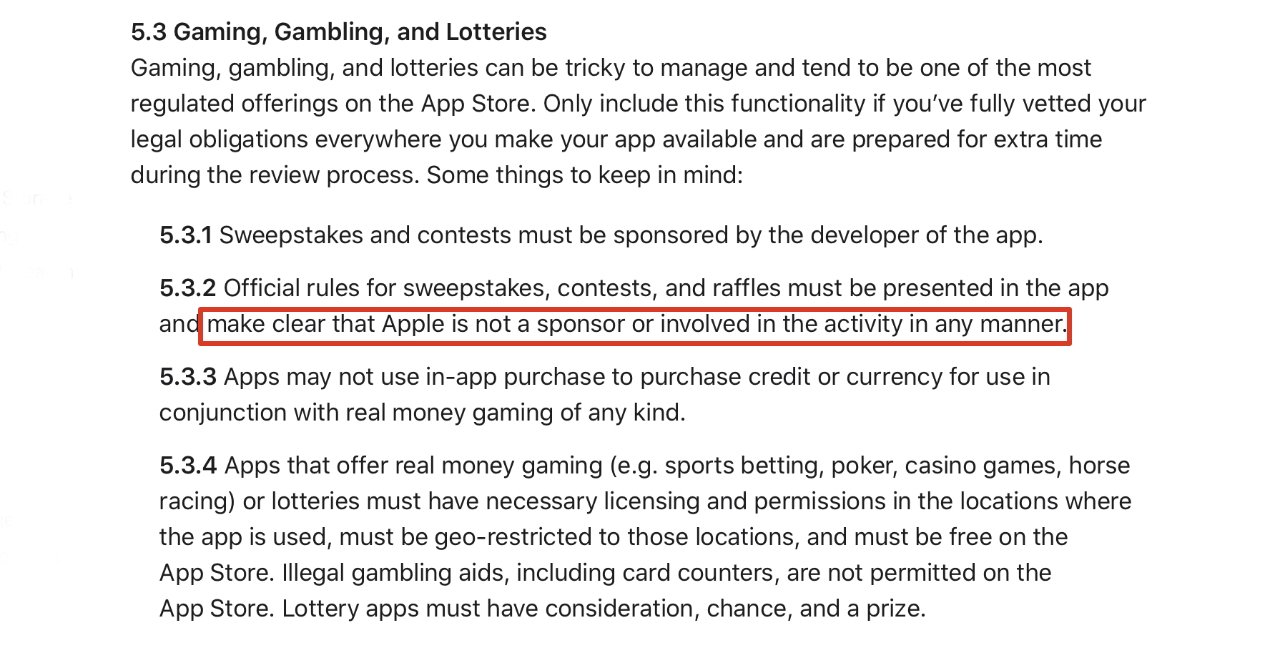Apple can argue about privacy, it can claim to put users before anything else, but when its business runs on gambling ads, it's moving yet further away from its stated principles and becoming a gambling company.

Composite: William Gallagher. Roulette wheel: Free Walking Tour Salzburg on Unsplash
Don't expect Tim Cook to agree. But where the line is blurry between actual privacy for users and leveraging privacy for profit, the line is as clear as a COVID test when it comes to whether Apple profits from gambling or not.
It's not a direct connection, it's not as if Apple gets all the real money you put into virtual slot machines -- but it does get a fee for the in-app currency that gambling apps can sell you. And it's also just monetized how social media apps sell boosted posts. Even so, Apple can say that it does not sell gambling, it just sells ads, it's not up to them to decide what those ads are for.
Actually, it is. But park that for a moment. Apple's own App Store guidelines have a little to say about gambling, but the key part is how apps must "make clear that Apple is not a sponsor or involved in the activity in any manner."

Apple wants to distance itself from gambling, but it's not doing a very good job
Apple wants no part of being associated with gambling within an app. But now with advertising, it's in it up to its neck. Apple takes money from gambling advertisers, and it doubtlessly places those ads in the places, and at the times, when they are most likely to get a return for those companies.
The companies do get a little say, but this just makes it worse. Advertisers can explicitly choose to have their ads appear only "in app categories different from mine."
Right now, that reportedly even includes when an ad spot just happens to be in a listing for childrens' apps.
I went to Apple's "Our Favorite Kids' Apps" section of the App Store, selected an app, and got presented with an ad for gambling. Not okay, Apple. pic.twitter.com/F0WUENr9z5
-- Simon B. Stovring (@simonbs) October 26, 2022
Normally, there would be a strong chance that Apple will universally fix that particular issue, and a strong chance that we will see at least fewer ads around children's apps considering that the response has been so loud about it.
However, since the rollout of the new ads, software engineer Shac Ron has revealed how vehemently opposed staff were to even the original plans for ads in the iOS App Store.
"When ads first appeared in the App Store in early iOS betas, many inside were very upset," he wrote. "It was an insult to our customers. We pushed back strongly. After a meeting where management pretended to listen to our concerns, it was evident they had no intention of changing their mind."
Ron also said that he was "glad to see Apple getting raked for ads in iOS."
If the reaction does prompt a fix to the more problematic placement of ads, it would probably rely on an afflicted Apple ID account being in Family Sharing. It would also require parental controls to have been set up properly.
And this is also assuming that the app's developers have correctly, and honestly, written their metadata. Apple has not been as thorough about developer honesty as it suggested.
Still, to be generous, this App Store ad push is new and like anything else, it takes time to settle in.
Only, the potential for this issue and blow-back about it is so great that nobody at Apple can have been ignorant of it. Outside observers may have hoped for a more curated, careful ad policy, but insiders have had time to actually do it -- and apparently have not.
Or they have just been calamitously poor at implementing the new ads. That would seem unlikely for a business intent on growing to $6 billion annually, but there are signs of it:
What's this? Ads for gambling at the bottom of a listing for a gambling addiction recovery app. How could this possibly go wrong? #Apple #appstore pic.twitter.com/9MQQvDMx8r
-- Jon (@hot_doggin_jon) October 26, 2022
Running an ad for a gambling app alongside an app aimed at helping gamblers recover from their addition is no joke. We can only hope it is a mistake.
Overall, though, it's been a choice to allow gambling ads, it hasn't been some filtering mistake, and so perhaps we're stuck with Apple bringing us the kind of experience you expect from Android.
Plus even if Apple does scale things back, we're left with the issue of what extent the company profits from gambling. The idea of it not profiting at all is over.
Apple and its principles under fire
You can make a case about people's right to choose gambling apps if they want -- and if they are adults. It's conceivably possible to argue that blocking gambling app ads would be some kind of censorship, although no one seems to object that strenuously to Apple rejecting porn apps.
What's not arguable is the direct causal relationship that there is now between gambling and some new revenue for Apple. And while it feels like this is a new thing, it's another step away from what Apple has claimed to stand for.
Just as the company's attempts to protect children are undermined by it now promoting gambling apps to them, so the firm's claim to be for creative people keeps taking a dent. For instance, Apple's famously successful "Shot on iPhone" campaign ripped off the photographers -- until criticism, including from AppleInsider -- made it stop.
Apple continues to say it supports developers, and it always quotes figures for how many jobs the iOS ecosystem has created in the world, but it's fine with stopping people's income. In 2018, it dropped its App Store affiliate program, switching off a revenue stream that was keeping websites and publications going.
It's easy to say that Apple has so much money that it shouldn't be penny-pinching like this, but of course you don't get to be profitable if you're not very careful with the bottom line.
Only, Apple is naturally extremely, but extremely savvy financially -- that appears to hope the rest of us are not.
Apple Card has laudable features that are designed to help sensible users handle their money, for example, but you can be certain a lot more users are unwise about their cash. Big profits from Apple Card rely not just on per-transaction fees, but also from a stack of interest from folks that carry balances.
Then there's the forthcoming Apple Pay Later, which is a Buy Now, Pay Later service. Those are always controversial, but current economic conditions make them worse. The Guardian reports that a third of UK BNPL users now can't make their payments, and it's not a lot better in the United States.
Loyalty to shareholders, or to customers
Apple is a business. Shareholders like money, and Apple does too.
That said, AppleInsider Managing Editor Mike Wuerthele is on record in saying that if Apple thought it could garner positive mindshare by becoming the puppy-kicking company, Tim Cook would lead every keynote with that.
Apple is not a charity, and it is proud of its extracurriculars. Apple has no obligation to help the homeless, or fight climate change, or help with education, and yet it does all these things. It leads keynotes with them.
We're not expecting a big keynote speech about gambling ads attached to gambling addiction recovery apps. We don't think Apple will hold it up as exemplary corporate behavior in its earnings.
What we are sure of, is that this is a money-grab. We're also sure that in a quarter or two, it will be an noticeable bump in revenue for the company, in what they have repeated is a challenging macro environment for this reason or that, for the last decade.
Gambling apps, though, are a billion-dollar rounding error in that noticeable bump. It's the equivalent of the money Apple can shake out of the sofa cushion. It's probably less per year than Apple will save by being more selective in hiring.
The fix is easy -- force app developers that are advertising to give accurate information on metadata, or get rejected, like App review does to their apps for any factor exactly like how if you look at the app at just the right angle and just the right time of day, it gets rejected. Or, let other app developers that have the adds on their App Store listings exclude categories of ads from their app. But, Apple, in its wisdom, has done neither.
Apple used to be the best because it considered the needs of users, and shied away from true exploitation of them. Apple is still the best, but not because of that anymore -- it's now only the best because it's less terrible and less exploitative of their customers than the other guys.
Update October 26, 6:37 PM ET An Apple spokesperson has told AppleInsider that "We have paused ads related to gambling and a few other categories on App Store product pages."